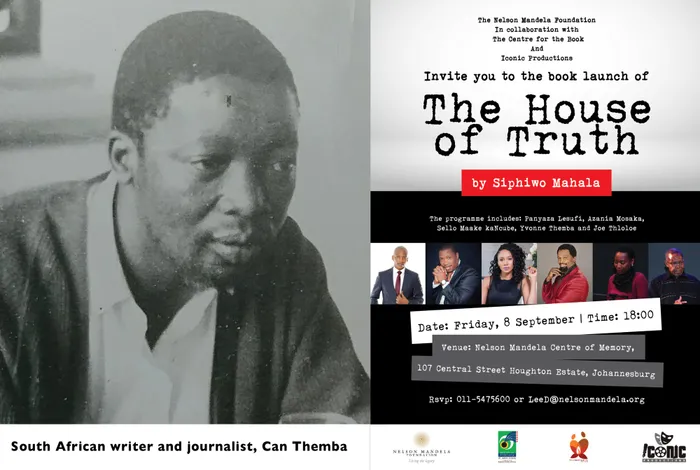The House of Truth: Can Themba’s way of cocking a snoot at officialdom

The Nelson Mandela Foundation, in collaboration with the Centre for the Book and Iconic Productions, today launches the book The House of Truth at the Nelson Mandela Centre of Memory.
The House of Truth is a bioplay inspired by the life of distinguished South African writer and journalist, Can Themba, written by Siphiwo Mahala.
The play derives its title from Themba’s single-room bachelor flat at 111 Ray Street, in Sophiatown of the 1950s. With the House of Truth, Themba was opening a platform for candid debate, and all those who were interested in intellectual engagement, black and white, were welcome.
According to Stan Motjuwadi, Themba’s former student, the House of Truth was “Can’s way of cocking a snoot at snobbery, officialdom and anything that smacked of the formal. Everybody but a snob was welcome at the House of Truth.”
After successful performances at the Grahamstown National Arts Festival, Market Theatre and Soweto Theatre, the play is now available in book form, published by Iconic Productions, a new black-owned production house, with support from the Centre for the Book.
The book is being launched today because it marks the 50th anniversary of the death of Themba. September 8 is also celebrated globally as International Literacy Day and in South Africa, it falls within National Book Week, from September 5 to 11.
The event will be paying homage to Themba as a distinguished teacher, writer and journalist, while at the same time highlighting the importance of literacy and a culture of reading.
The programme director will be radio personality Azania Mosaka, with the keynote address by Panyaza Lesufi, the
Gauteng MEC for Education, and the programme features a discussion with prominent individuals like former Press Ombudsman, Joe Thloloe, business executive and Can Themba’s daughter, Yvonne Themba, and a special performance by distinguished actor Sello Maake kaNcube.
Daniel Canodoce Themba (Can Themba) was born on June 21, 1924, in Marabastad, Pretoria. He grew up partly in the township of Atteridgeville and did his schooling at Khaiso Secondary School, a boarding school situated near Polokwane.
He was the first recipient of the Mendi Memorial Scholarship, with which he studied at the University of Fort Hare from 1945 to 1947, graduating for his BA degree with a distinction in English. He later returned to university to study towards the University Education Diploma.
He worked as a teacher at various schools, including Madibane High in the Western Township, as well as the Central Indian High School in Fordsburg. In 1953 he won the inaugural Drum short story competition and joined the magazine as a reporter and later became the associate editor. He left Drum in 1959 and later went into exile in Swaziland.
In 1966 he was banned under the Suppression of Communism Act of 1950.
He died of coronary thrombosis while in his flat in Manzini on September 8, 1967. His work was published posthumously in: The Will to Die (1972), The World of Can Themba (1985) and Requiem for Sophiatown (2006).
He has received numerous accolades posthumously, including the Order of Ikhamanga in Silver for “Excellent Achievement in Literature, contributing to the field of journalism and striving for a just and democratic society in South Africa,” which was awarded by President Thabo Mbeki in 2006.
Siphiwo Mahala is a prominent novelist, short story writer and a great admirer of Can Themba’s work.
His books include the novel, which he translated to his Xhosa language as, and African Delights, a collection of short stories which includes one of his most celebrated, The Suit Continued, a rejoinder to Can Themba’s The Suit.
In January 2016, The Guardian newspaper in the UK listed African Delights as one of the top 10 must-read books in the world.
The House of Truth, his debut play, was first performed by the venerable actor Sello Maake kaNcube at the Grahamstown National Arts Festival to rave reviews and sold-out shows.
Born in Grahamstown, in the Eastern Cape , Mahala is a graduate of the University of Fort Hare and holds a Master of Arts in African Literature from Wits.
He is a doctoral candidate at Unisa with Can Themba the focus of his research.
He served as the head of Books and Publishing at the Department of Arts and Culture for a period of more than 10 years.
He was recently announced as one of the judges for the 2018 Mobile Prize for Literature (formerly known as the Etisalat Prize), the biggest literary prize for new writers on the African continent.